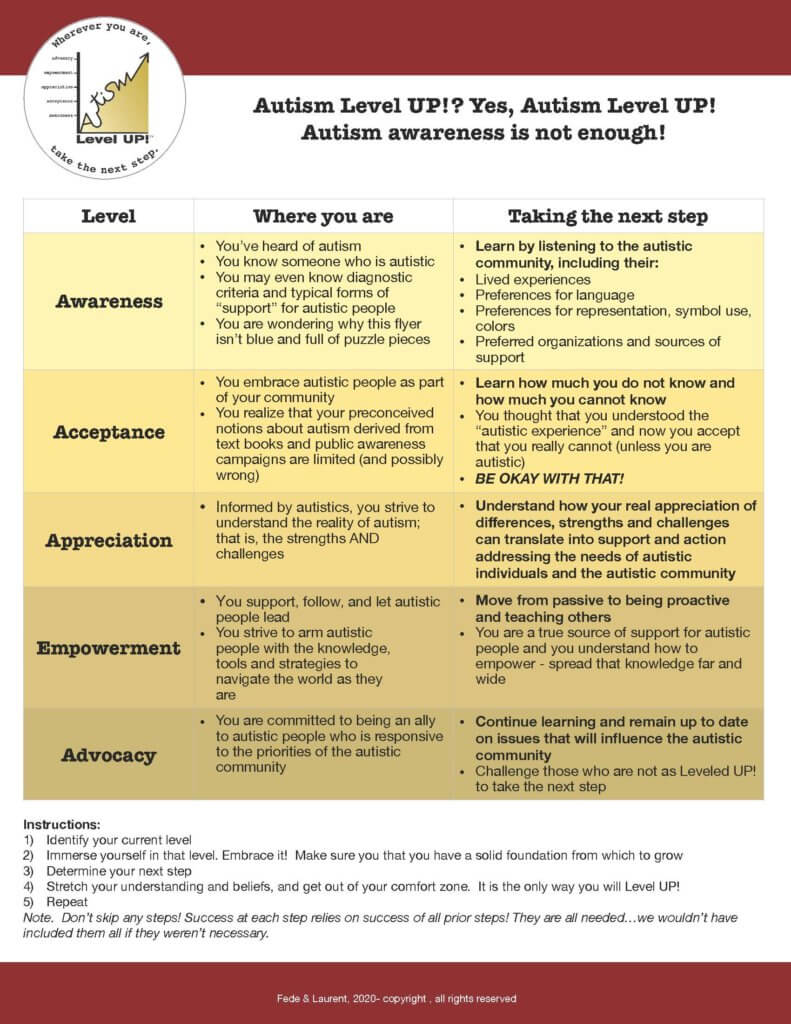Today (April 2) is World Autism Awareness Day. It’s a day full of social media campaigns and fundraisers all focused around bringing attention to autism and autism research. I truly believe that everyone who shares the message is doing it with the best of intentions. But what type of awareness is it raising? Most importantly, what is it doing for (or to) the autistic community?
Autism Awareness through a Neurodiversity Lens
The neurodiversity movement, which has grown over the past decade, is based on the idea that conditions such as autism are “naturally occurring cognitive variations with distinctive strengths that have contributed to the evolution of technology and culture, rather than mere checklists of deficits and dysfunctions” (Steve Silberman, Neurotribes: The Legacy of Autism and the Future of Neurodiversity).
In this paradigm, which is supported by autistic individuals all over the world, autism is viewed not as a disease to be cured, but as an alternative neurological wiring. Autistic individuals speak a different neurological language than neurotypicals. This does not mean that autism is not disabling, or that it does not present challenges (more on this later). But the fact that huge amounts of funding have been devoted to researching the “cause” of autism and trying to find “cures” ignores the unique strengths of autistic individuals. Autistic adults feel dehumanized and ignored when the focus of the world is only on their perceived deficits rather than their value. Wouldn’t you?
Why do I keep saying “Autistic?”
You may be cringing by now by my repeated use of the word “autistic” instead of “people with autism.” Up until a few months ago, I would have been right there with you, as I was trained to use person-first language. But as I have read more about the neurodiversity movement and followed more autistic advocates on social media, I have realized that the overwhelming majority of them prefer identity-first (“autistic”) rather than person-first language. Why? Because autism is central to their identity. They cannot be separated from autism. Using person-first language perpetuates the concept that autism is a disease or an ailment.
Support is Still Needed
As I mentioned, the neurodiversity movement does NOT imply that autistic individuals do not need support. In fact, it states the opposite. Autistic people are expected to live in a world that was designed for people speaking a different neurological language. Many autistic individuals thrive when provided with adequate support and environmental modifications that help them navigate this world. But, when “support” or “intervention” focuses merely on extinguishing autistic behavior and not on enabling the autistic individual to navigate their environment successfully, it is ineffective.
Strengths and Challenges of Autism
Every autistic individual is unique, and these lists are not all-inclusive, nor do they apply to every autistic individual. But, to increase understanding, I feel it is important to acknowledge common strengths and challenges associated with autistic neurology. This particular list is adapted from NeuroClastic and drawn from autistic voices:
Strengths:
- The ability to notice details that others miss
- The ability to intensely focus on a subject of special interest
- The ability to develop exceptional critical thinking skills and to think outside of social norms
- The ability to see how the parts of a whole are interconnected
- The ability to think of alternative solutions
Challenges:
- Much more energy than is typical is used to filter information and sensory input
- Difficulty accepting rules that don’t make sense because they were designed for neurotypical neurology
- Intentions are misunderstood, or misinterpreting the intentions of others, due to differences in processing
- Need to “study” to do things that come natural to others because these things were made for the way neurotypicals process the world
Moving Beyond Autism Awareness
What does it truly mean to go beyond autism awareness? This graphic, one of the many free resources available from Dr. Amy Laurent and Dr. Jacquelyn Fede at Autism Level UP articulates it much better than I could, so here it is:

On this Autism Awareness Day, let’s do better than awareness. Let’s listen to autistic voices and share the rainbow infinity symbol of neurodiversity instead of blue puzzle pieces. Overall, let’s take steps to accept, appreciate, empower, and advocate for autistic people everywhere.
Additional resources
There are a multitude of autistic advocates that you can find and follow on YouTube, Facebook, and other social media platforms. Here are a few:
Search the hashtag #actuallyautistic
If your child is autistic and you are looking for treatment using a neurodiversity perspective, contact us to arrange a free occupational therapy consultation today.
